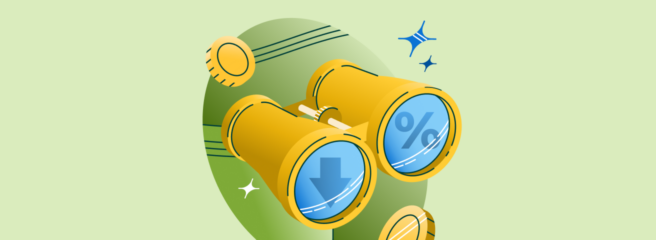
Key takeaways:
- A fixed-rate loan comes with interest rates that won’t change throughout the term of the loan.
- With a variable-rate loan, your interest rate could change based on external factors.
- Variable-rate loans may be marginally more affordable over time. However, fixed-rate loans can provide a sense of financial security through set monthly payments.
If you’ve been researching loans, you’ve likely seen the terms “fixed-rate” and “variable-rate.” Understanding these terms and how they can impact the cost of borrowing can help you make smarter financial decisions.
In this guide, we’ll break down the differences between fixed- and variable-rate loans. We’ll also take a look at the pros and cons of each so you can determine which option works best for you.
What is a fixed interest rate loan?
A fixed-rate loan is a loan with an interest rate that won’t change over the life of the loan, regardless of what happens to external market rates. One of the most common examples of a fixed-rate loan is a 30-year fixed-rate mortgage.
How do fixed-rate loans work?
Essentially, a fixed rate means the cost of borrowing will remain the same, no matter if the market rises or falls. When you get a loan with a fixed rate, your lender will set your interest rate based on the market rate at the time. They will also consider factors like your credit score, repayment history, and borrowing habits. Once you accept the loan, your rate will be locked in for the life of the loan.
Deciding to take out a fixed-rate loan can provide borrowers with a high level of financial confidence. You won’t ever have to worry about your monthly payments increasing. You’ll know exactly how much you’ll pay each month, making it easier to budget for the long term.
Your rate won’t fluctuate if market rates fall, though. Consider the current interest rate environment and projected changes before locking in your interest rate.
Pros and cons of a fixed interest rate loan
| Pros of a fixed-rate loan | Cons of a fixed-rate loan |
|
|
What is a variable interest rate loan?
A variable-rate loan is one with an interest rate that may change over the loan term. In most cases, the interest rate on a variable-rate loan is tied to an external financial benchmark. Some of the most common benchmarks used by lending companies and financial institutions include:
- The Federal Reserve’s federal funds rate
- The London Interbank Offered Rate (LIBOR)
- The Prime Rate, which is set by individual banks
How do variable-rate loans work?
Variable-rate loans work similarly to fixed-rate loans. You determine how much you need to borrow, then proceed to the application and approval processes. If you’re approved for a variable-rate loan, you’ll likely receive your money in one lump sum. Then, you’ll begin making payments on your loan principal, plus interest.
Unlike a fixed-rate loan, the interest rate on your variable-rate loan could change on a monthly, quarterly, or annual basis. If your loan interest rate drops or rises, your monthly payment will change accordingly.
That said, studies have shown that borrowers tend to spend less on a variable-rate loan over time. In addition, rate changes often have a relatively moderate impact on monthly payments.
It’s important not to make decisions based solely on historical data, though. Instead, take some time to consider the following pros and cons of variable interest rate loans to help determine which option is best for you.
Pros and cons of a variable interest rate loan
| Pros of a variable-rate loan | Cons of a variable-rate loan |
|
|
Do variable interest rates ever drop?
When choosing between a fixed-rate and variable-rate loan, people tend to worry about increasing rates. However, variable rates can rise and fall.
The Federal Reserve is more likely to drop interest rates during an economic recession to boost borrowing activity. One recent example is the Fed’s March 2020 decision to drop interest rates by 1.5% in response to the COVID-19 pandemic. Doing so decreased the cost of borrowing and made it easier to access affordable loans.
Is a variable or fixed rate better?
Ultimately, choosing between a variable- or fixed-rate loan comes down to a few factors, including:
- Average market rates
- Loan terms
- Type of loan
- Financial circumstances
Let’s take a closer look at how each factor could impact short-term borrowing and long-term financial health.
1. Average market rates
Before signing onto a loan, take a look at average market rates. If rates are trending downward, you may decide to take a chance on a short-term, variable-rate loan. But if you’re planning to take out a long-term loan, you may consider locking in a low rate now rather than risking a rate hike in the future.
2. Loan terms
As we mentioned above, the length of your loan can also influence the decision to lock in a rate or go with a variable interest rate loan. That’s because it’s nearly impossible to predict long-term market conditions.
You may be able to predict short-term economic behavior—or at least make an educated guess based on current market activity. As a result, choosing a short-term loan with a variable rate may be a safer bet than a long-term loan.
3. Type of loan
Trying to determine if a fixed- or variable-rate loan is best for you? Don’t forget to think about the type of loan you need.
You can typically find fixed- and variable-rate options for personal loans, mortgages, student loans, or car loans. So it’s important to understand the specifics of each type of loan and how a fixed or variable rate could affect your payments over the life of the loan.
To put these details into perspective, consider the following examples:
Fixed-rate vs. variable-rate mortgage
Though rates for a 30-year mortgage have risen slightly over the last two years, average rates are still near 2020’s historical lows. With that in mind, locking in a mortgage rate could help you save over time, especially if you plan to own your home long-term.
If you plan to sell your home in a few years or know the Fed is planning to lower rates in the near future, you may prefer a variable-rate mortgage. Also known as adjustable-rate mortgages, some lenders offer low-interest introductory periods that may help you save on payments. Adjustable-rate mortgages also allow you to take advantage of decreasing rates now and in the future.
Variable vs. fixed-rate personal loan
You may decide to take out a fixed-rate personal loan if you prefer predictable payments you can work into your budget. Opting for a fix-rate loan may also help you save on interest, especially if you have a solid credit score and can qualify for an affordable rate.
Even if your credit score could use some work, you may still be able to qualify for a better interest rate on a personal loan through a marketplace like Upstart. Our model looks at more than your credit score and considers factors like your education and work experience to help you find an affordable loan.
On the other hand, a short-term, variable-rate personal loan could be a manageable way to repay credit card debt or cover medical expenses.
Other potential benefits of a short-term, variable-rate personal loan include:
- A possible low-interest introductory period
- The possibility of a lower rate if average market rates fall in the future
Still, the risk of a rate hike could leave you with higher monthly payments for a variable-rate loan.
4. Financial circumstances
Finally, consider your financial circumstances before choosing a fixed- or variable-rate loan. If you prefer predictability and want to feel confident you will always be able to cover your loan payments, then a fixed-rate loan may be a better choice for you.
But if you’re more interested in getting a lower interest rate on a short-term loan, a variable rate may be a good idea. The inherent risk of a variable-rate loan may also decrease if you expect to earn a higher salary in the near future.
The bottom line: Is a fixed-rate or variable-rate loan better?
Ultimately, deciding between a fixed-rate or variable-rate loan depends on your circumstances and preferences.
The decision may change based on the type of loan you need and the current or predicted economic climate. The right option for you today may look different from the right option a year from now. Do your research and choose the solution that keeps you moving toward a healthier financial future.







 Won't affect your credit score¹
Won't affect your credit score¹